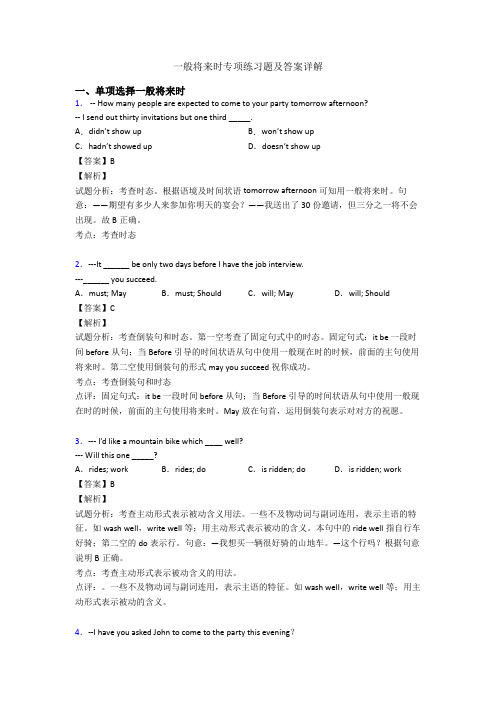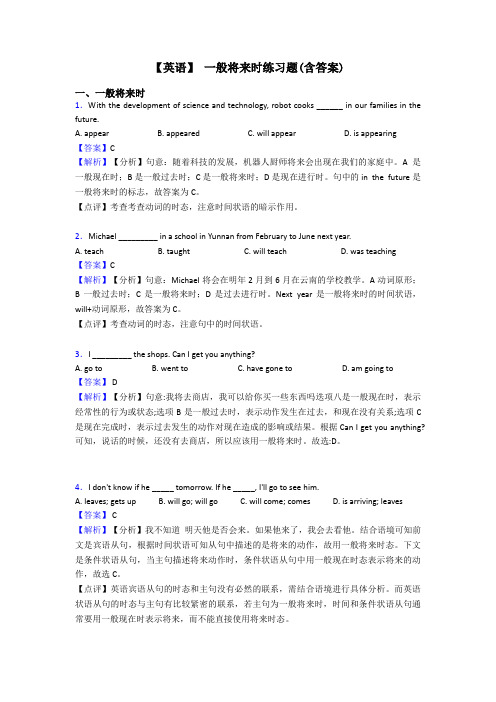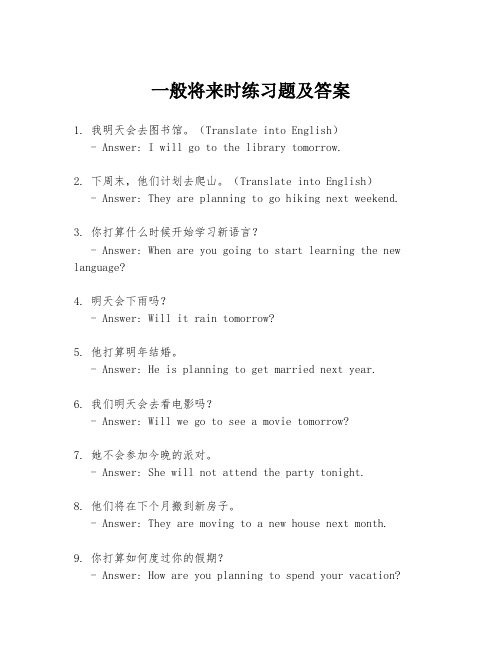一般将来时归纳及专项练习题
【整理】中考英语一般将来时专项练习(附答案)50题

初中英语:一般将来时专项练习题1.--There aren’t any libraries in our town, are there ? --No, but it is said one _____ next year.A.will be built B.is built C.will build【答案】A【解析】【详解】解析:句意:——我们镇上没有图书馆,是吗?——是的,但是据说明年将会修建一个。
由句中时间状语next year可知是一般将来时,且library与build之间是被动关系。
故答案选A。
点睛:通过观察句子结构可知it is said one_____next year为含有主语从句的复合句,其中主句 it is said 是一般现在时,从句可以用所需要的时态,根据时间状语next year表示一个将来的时间,故从句的时态为一般将来时,再根据从句的主语为one代指上文中的library是谓语动词build的承受者,二者形成被动关系,故用被动语态,所以谓语动词为一般将来时的被动语态,其结构为will+be+及物动词的过去分词,build的过去分词为built。
故答案选A。
2. ---What can I do for you?---I’m looking for the new CD by Li Jian.---Good taste,and only a few left.I believe the CDs you ask for out soon.A.being sold B.is soldC.will be sold D.was selling【答案】C【解析】【详解】试题分析:句意:――我能为你做什么吗?――我正在寻找李建的新唱片。
――好品味,仅剩几张了,我相信你要的唱片很快会被卖光的。
根据soon可知,应该用将来时。
当主语是动作的承受者时,用被动语态。
结合句意,故选C考点:考查一般将来时的被动语态。
英语时态之一般将来时(练习题及答案)

英语时态之一般将来时一、什么是时态时态就是表示一个动作发生的时间和所处的状态。
“时”就是这个动作发生的“时间”;“态”就是这个动作在某个时刻的“状态”。
二、时间的定义英语中把时间分为三类,即:过去现在将来三、状态的定义状态指的是在某个时刻这个动作所处于的状态。
动词共有四类状态,分别为:一般式、进行式、完成式和进行完成式。
1.一般式表示经常发生的动作,其动词形式为do例:I often get up at 7.我经常在七点钟起床。
2.进行式表示正在进行的动作,其动词形式为“be动词+ doing”例:She is singing a French song.她正在唱一首法语歌。
3.完成式表示对“之前发生动作”的一个总结,其动词形式为“have + done”例:They have found the missing child.他们找到那个失踪的孩子了。
4.完成进行式表示对“正在进行动作”的一个总结,其动词形式“have + been + doing”例:I have been reading books for two hours.我已经连续读书两个小时了。
四.一般将来时(will do):一般将来时表示某个将来的时间发生的动作或存在的状态。
1.在表示预测时,在一般将来时态中will和be going to的区别:(1).用be going to 特别指根据目前的明显迹象来推断某件事将要发生;而will则只是表明说话人认为或相信某件事将要发生。
(2).be going to 通常用来表示说话人预期所说的事件马上或在相当近的将来就要发生;而will 所表示的动作发生的时间可近可远。
2.在表示意愿时,在一般将来时态中will和be going to 的区别:(1)be going to 表示说话人对未来行动的计划或打算,通常是经过事先考虑并含有已经为这一行动做了某些准备的意思。
(2)will表示在说话的时刻立即做出决定将去做某事,事先并没有经过考虑,更没有为这一活动做出事先的准备。
一般将来时专项练习题及答案详解

一般将来时专项练习题及答案详解一、单项选择一般将来时1. -- How many people are expected to come to your party tomorrow afternoon?-- I send out thirty invitations but one third _____.A.didn’t show up B.won’t show upC.hadn’t showed up D.doesn’t show up【答案】B【解析】试题分析:考查时态。
根据语境及时间状语tomorrow afternoon可知用一般将来时。
句意:——期望有多少人来参加你明天的宴会?——我送出了30份邀请,但三分之一将不会出现。
故B正确。
考点:考查时态2.---It ______ be only two days before I have the job interview.---______ you succeed.A.must; May B.must; Should C.will; May D.will; Should【答案】C【解析】试题分析:考查倒装句和时态。
第一空考查了固定句式中的时态。
固定句式:it be 一段时间 before从句;当Before引导的时间状语从句中使用一般现在时的时候,前面的主句使用将来时。
第二空使用倒装句的形式may you succeed祝你成功。
考点:考查倒装句和时态点评:固定句式:it be 一段时间 before从句;当Before引导的时间状语从句中使用一般现在时的时候,前面的主句使用将来时。
May放在句首,运用倒装句表示对对方的祝愿。
3.--- I’d like a mountain bike which ____ well?--- Will this one _____?A.rides; work B.rides; do C.is ridden; do D.is ridden; work【答案】B【解析】试题分析:考查主动形式表示被动含义用法。
【英语】 一般将来时练习题(含答案)

【英语】一般将来时练习题(含答案)一、一般将来时1.With the development of science and technology, robot cooks ______ in our families in the future.A. appearB. appearedC. will appearD. is appearing【答案】C【解析】【分析】句意:随着科技的发展,机器人厨师将来会出现在我们的家庭中。
A是一般现在时;B是一般过去时;C是一般将来时;D是现在进行时。
句中的in the future是一般将来时的标志,故答案为C。
【点评】考查考查动词的时态,注意时间状语的暗示作用。
2.Michael _________ in a school in Yunnan from February to June next year.A. teachB. taughtC. will teachD. was teaching【答案】C【解析】【分析】句意:Michael将会在明年2月到6月在云南的学校教学。
A动词原形;B一般过去时;C是一般将来时;D是过去进行时。
Next year是一般将来时的时间状语,will+动词原形,故答案为C。
【点评】考查动词的时态,注意句中的时间状语。
3.I _________ the shops. Can I get you anything?A. go toB. went toC. have gone toD. am going to【答案】 D【解析】【分析】句意:我将去商店,我可以给你买一些东西吗迭项八是一般现在时,表示经常性的行为或状态;选项B是一般过去时,表示动作发生在过去,和现在没有关系;选项C 是现在完成时,表示过去发生的动作对现在造成的影响或结果。
根据Can I get you anything?可知,说话的时候,还没有去商店,所以应该用一般将来时。
一般将来时练习题及答案

一般将来时练习题及答案1. 我明天会去图书馆。
(Translate into English)- Answer: I will go to the library tomorrow.2. 下周末,他们计划去爬山。
(Translate into English)- Answer: They are planning to go hiking next weekend.3. 你打算什么时候开始学习新语言?- Answer: When are you going to start learning the new language?4. 明天会下雨吗?- Answer: Will it rain tomorrow?5. 他打算明年结婚。
- Answer: He is planning to get married next year.6. 我们明天会去看电影吗?- Answer: Will we go to see a movie tomorrow?7. 她不会参加今晚的派对。
- Answer: She will not attend the party tonight.8. 他们将在下个月搬到新房子。
- Answer: They are moving to a new house next month.9. 你打算如何度过你的假期?- Answer: How are you planning to spend your vacation?10. 我将尽力完成这项工作。
- Answer: I will try to finish this work.答案解析- 一般将来时的构成通常有两种形式:"will + 动词原形"和"begoing to + 动词原形"。
"will"表示将来的意愿或预测,而"be going to"则表示有计划或意图的将来行为。
英语一般将来时练习题及答案

英语一般将来时练习题及答案一、单项选择一般将来时1.--How about buying Tim a mobile phone ? After all, he isn’t a boy any more.--I think it’s necessary, for we sometimes want to make sure if he ____ for dinner.A.will come B.comes C.has come D.would come【答案】A【解析】试题分析:考查动词时态。
句意:给他提姆买个手机怎么样?毕竟他不再是个孩子了。
我认为是必要的,因为我们有时会想确认他是否会回来吃饭。
根据句意这是一个宾语从句,确认他是否将回来吃饭,是一般将来时, A. will come一般将来时 B. comes一般现在时 C. has come现在完成时 D. would come过去将来时,所以A正确。
考点:考查动词时态。
2.If you _____ his wife’s income____ his own,the total of their income _____ 3000 yuan.A.add; to; will add up to B.add; to; adds toC.add up; to; adds up to D.will add; for; adds up【答案】A【解析】试题分析:考查if引导条件状语从句及词的用法。
主句用一般将来时,从句用一般现在时表将来。
排除D。
Add...to 把...加在..., add up to总计达, add to增添。
句意:如果把他妻子的收入和他的收入加起来,总计达3000元。
考点:考查if引导条件状语从句及词的用法点评:if引导条件状语从句主句用一般将来时,从句用一般现在时表将来。
3.If our marketing plan succeeds, we _______ the sales by thirty percent next year.A.would increase B.will increaseC.would have increased D.will be increasing【答案】B【解析】试题分析:考查时态。
(整理)一般将来时练习题及答案50题
初中英语:一般将来时专项练习题1.A lot of new roads _______ in order to develop the villages in the next five years.A.builtB.were builtC.buildD.will be built【答案】D【解析】【详解】句意:在接下来的五年,为了发展那个村庄,很多新路将被修建。
根据时间状语in the next five years可知此处用一般将来时,结合句意,道路被修建,故用被动语态,故为will be built。
故选D。
2.—The 2016 Summer Olympic Games in Rio de Janeiro from August 5 to August 21.—Wow, we can enjoy the match then.A.will hold B.will be heldC.was held D.is holding【答案】B【解析】【详解】试题分析:句意:—2016年夏季奥运会将于8月5日到8月21日在巴西里约热内卢举行。
-哇,我们可以享受比赛。
本句是将来时态的被动句will be +动词过去分词。
所以选B。
考点:考查被动句。
3.Different kinds of clothes ________ delivered to the earthquake-hitarea tomorrow.A.will be B.had been C.were D.are【答案】A【解析】【详解】句意:不同种类的衣服明天将寄到地震区。
考查时态、语态。
根据时间状语tomorrow判断句子用一般将来时,主语different kinds of clothes是动作的承受着,判断用被动语态;一般将来时、被动语态的谓语动词的构成是“will +be +过去分词”,故选A。
4.Have you heard that the 2022 Winter Olympics ______________ in Beijing?A.held B.are held C.were held D.will be held 【答案】D【解析】【详解】句意:你听说了吗,2022年冬季奥运会将在北京举行?held举行,过去式或过去分词;are held一般现在时的被动语态;were held一般过去时的被动语态;will be held一般将来时的被动语态。
一般将来时讲解(附习题+答案)
一般将来时讲解(附习题+答案)一、一般将来时的含义:表示动作发生在将来二、一般将来时的句型:(1) will/shall+动词原形(2) be going to+动词原形三、一般将来时的时间状语:tomorrow(明天)、the day after tomorrow(后天)、next...(下一...): next week(下一周)、next year(明年)、next month(下个月)in+一段时间(...之后): in three days(三天之后)、in the future在未来this evening(今天晚上)四、一般将来时的句型结构:(1) will/shall+动词原形(will not =won’t)(will 各种人称均可用,shall 只能用于第一人称)1)肯定句:主语+will/shall+动词原型...如:I will go to school tomorrow.我明天将会去学校He will go to school tomorrow.他明天将会去学校。
2)否定句:主语+will/shall+not+动词原型...如:I won’t go to school tomorrow.我明天将不会去学校。
He won’t go to school tomorrow.他明天将不会去学校。
3)一般疑问句:Will/Shall +主语+动词原型...如:Will you go to school tomorrow?你明天要去学校吗?Will he go to school tomorrow?他明天要去学校吗?肯定回答:Yes, 主语+will.如:Yes, I will.Yes, he will.否定回答:No,主语+will+not.如:No, I won’t.No, he won’t.4) 特殊疑问句:特殊疑问词+will/shall+主语+动词原型...如:What will you do tomorrow?你明天将会做什么?What will he do tomorrow?他明天将会做什么?(2) be going to+动词原形1)肯定句:主语+be going to +动词原型...如:I am going to buy some books tomorrow.我明天打算去买一些书。
一般将来时题目及答案50道
一般将来时题目及答案50道1. What time ____________ (you / leave) for the party tomorrow?Ans: will you leave2. The concert ____________ (start) at 7 pm tonight.Ans: will start3. My parents ____________ (visit) us next month.Ans: will visit4. We ____________ (go) to the beach this weekend if the weather is good.Ans: will go5. She ____________ (call) you later today.Ans: will call6. They ____________ (not / arrive) until tomorrow.Ans: will not arrive7. I ____________ (send) you the report by email tomorrow.Ans: will send8. ____________ (you / come) to the party on Saturday?Ans: Will you come9. My brother ____________ (start) his new job next week.Ans: will start10. We ____________ (meet) at the café at 6 pm tomorrow.Ans: will meet11. She ____________ (not / be) here tomorrow.Ans: will not be12. ____________ (it / rain) tomorrow?Ans: Will it rain13. I ____________ (buy) a new car next year.Ans: will buy14. We ____________ (not / see) each other again.Ans: will not see15. ____________ (you / finish) your homework before going out?Ans: Will you finish16. Tom ____________ (help) me with my project on Friday.Ans: will help17. They ____________ (not / believe) what we tell them.Ans: will not believe18. ____________ (she / pass) her exam?Ans: Will she pass19. We ____________ (have) dinner at the new restaurant tonight.Ans: will have20. I ____________ (not / tell) anyone about this.Ans: will not tell21. ____________ (you / do) me a favor?Ans: Will you do22. Jenny ____________ (come) to the party if she is free.Ans: will come23. The train ____________ (leave) at 8 am tomorrow.Ans: will leave24. We ____________ (not / stay) at that hotel again.Ans: will not stay25. ____________ (it / be) hot tomorrow?Ans: Will it be26. He ____________ (get) a promotion next month.Ans: will get27. They ____________ (not / forget) your birthday.Ans: will not forget28. ____________ (you / join) us for lunch?Ans: Will you join29. Mark ____________ (bring) his laptop to the meeting.Ans: will bring30. I ____________ (not / be) able to attend the meeting tomorrow.Ans: will not be31. ____________ (you / pick) me up from the airport?Ans: Will you pick32. The price of petrol ____________ (go) up next week.Ans: will go33. She ____________ (not / pass) the exam if she doesn’t study.Ans: will not pass34. ____________ (you / be) here tomorrow?Ans: Will you be35. They ____________ (get) married next year.Ans: will get36. The restaurant ____________ (close) for renovations next month.Ans: will close37. We ____________ (not / invite) him to the party.Ans: will not invite38. ____________ (it / snow) in winter?Ans: Will it snow39. He ____________ (buy) a new phone as soon as he gets his salary.Ans: will buy40. Jane ____________ (not / go) to the gym tomorrow.Ans: will not go41. ____________ (you / lend) me your pen?Ans: Will you lend42. They ____________ (wait) for us at the restaurant.Ans: will wait43. The new movie ____________ (release) next week.Ans: will release44. We ____________ (not / go) to the party if we are not invited.Ans: will not go45. ____________ (you / help) me with this problem?Ans: Will you help46. She ____________ (take) a break after finishing the project.Ans: will take47. They ____________ (not / believe) what he says.Ans: will not believe48. ____________ (he / pass) the test?Ans: Will he pass49. We ____________ (not / buy) a new car this year.Ans: will not buy50. ____________ (you / come) to the party with us?Ans: Will you come。
小升初英语一般将来时阅读理解专项练习题(含答案解析)
1、阅读短文,判断正(T)误(F)。
Amy:Where are you going this summer holiday? John:I’m going to Guilin. Amy:Oh, I went there with my mom last summer holiday. 、 John:Really? How did you get there? Amy:I went to Guilin by train. It was crowded on the train. John:I’m going there by plane. Amy;Good idea. Who are you going with? John:I’m going with my parents. Amy:Guilin is very beautiful. We were very happy on our trip. You will have a good time. John: Thank you.
⑴John is going to Guilin with his father and mother this summer holiday. ⑵Amy went there with her parents last year. ⑶It was not comfortable to go there by train. ⑷John is going there by plane. ⑸Guilin is in north of China.
• ⑷还是由句子John: I’m going therห้องสมุดไป่ตู้ by plane.“John:我打算坐飞机去那。”
- 1、下载文档前请自行甄别文档内容的完整性,平台不提供额外的编辑、内容补充、找答案等附加服务。
- 2、"仅部分预览"的文档,不可在线预览部分如存在完整性等问题,可反馈申请退款(可完整预览的文档不适用该条件!)。
- 3、如文档侵犯您的权益,请联系客服反馈,我们会尽快为您处理(人工客服工作时间:9:00-18:30)。
一般将来时归纳及专项练习题一、单项选择一般将来时1.---Do you have any special plan for this weekend?---Yes. I my daughter to Disneyland.A. am going to takeB. takeC. have takenD. would take【答案】A【解析】试题分析:考查时态。
根据句中的时间状语this weekend,可以判断用将来时。
英语中经常用现在进行时代替将来时。
句意:一一这个周末你有什么特别的计划?一一是的,我打算带我女儿去迪斯尼。
故A正确。
考点:考查时态2.Half the world,s population water shortages within 15 years according to the World Bank, just one of many recent alarming reports on the world,s fresh water supply.A. are sufferingB. have been sufferedC. will sufferD. were suffered【答案】C【解析】试题分析:根据时间状语within 15 years,故用一般将来时。
考点:时态考查题点评:通过时间状语,上下句意思和具体语境来确定时态。
3.--I have you asked John to come to the party this evening?--Yes, I have, but heA. doesn'tB. hasn'tC. hadn'tD. won't【答案】D【解析】试题分析:此处doesn't表示一般现在时;hasn't现在完成时;hadn't过去完成时;won't 一般将来时,意为:不愿,表意愿。
句意:一我让你请求John来参加今晚是聚会?一是的,我请了,但他不愿意来。
根据句意选D。
考点:考查动词时态。
4.The computers made by our company sell best, but several years ago no one could have imagined the role in the markets that they.A.were playingB.were to playC.had playedD.played【答案】B【解析】试题分析:考查时态:我们公司生产的电脑卖的最好,但是几年以后没有人能想象它曾经将在市场中扮演什么样重要的角色。
were to do是过去将来时,表示过去想象电脑将会起到的作用。
选B。
考点:考查时态5.We are always told that only through hard work our goals in our study.A. we will achieveB. we have achievedC. have we achievedD. will we achieve【答案】D【解析】试题分析:考查倒装句:句意:有人告诉我们只有通过努力学习我们在学习上才能达到目标。
That引导的是宾语从句,宾语从句是用only+介词短语,构成的状语,句子用部分倒装,根据句意要用一般将来时,选D。
考点:考查倒装句6.What you learn today of practical use when you hunt for a job.A. is provedB. provesC. will be provedD. will prove【答案】D【解析】试题分析:考察时态和系动词。
系动词prove证明,没有被动语态。
排除AC项。
句义:你今天所学得内容再你寻找工作的时候将会证明是很实用的。
根据句义是指在将来找工作的时候证明是有用的。
故D正确。
考点:考察时态和系动词用法7.Only by practising a few hours every day be able to play the piano well.A.you wouldB.would youC.you willD.will you【答案】D【解析】试题分析:考查倒装句和时态:句意:只有你每天练习几个小时,你才能把钢琴弹好。
Only+副词/介词短语/状语从句+主句(主句用部分倒装),而且这句话的时间是every day,所以用一般现在时will,选D。
考点:考查倒装句和时态8.— Lucy, how are you getting on with your composition?—I have rewritten it so many times that I wonder if I it.A. finishB. finishedC. have finishedD. will finish【答案】D【解析】试题分析:考查时态。
能不能写完应是将来发生的动作,因此应用将来时。
句意:一一Lucy,你的作文写得怎样了?一一我重写了太多次了,我怀疑能不能写完。
故D正确。
考点:考查时态9.— What do you want for breakfast, Joe?—I think I some bread and milk.A. will haveB. am going to haveC. hadD. am having【答案】A【解析】试题分析:句意:--早饭你准备吃什么?--我想我想吃些面包和牛奶。
因为是将要吃..用一般将来时,排除C, ABD都可以表示一般将来时,will是临时决定,be going to do是计划,打算,be doing是即将,马上做…,所以选A。
考点:考查时态10.(吉林长春高中毕业班第一次调研)一Alas! I have left my key to the office in my car. — Don't worry. I it for you. Wait a minute.A.getB.am going to getC.will getD.am getting【答案】C【解析】C考查时态。
答语意为"别担心,我帮你去取。
等一下。
〃此处will用于一般将来时,表示"将要做临时决定的事情〃。
11.The project to developing the economy and reducing poverty when it is completed.A.has contributedB.had been contributedC.will contributeD.is contribute【答案】C【解析】试题分析:考查动词的时态。
句意:这项工程在竣工后,将会继续发展经济,减少贫穷。
根据句意可知表示将要发生的事情,用一般将来时,选C考点:考查动词的时12.The sky is clouding over;we can see there a rainstorm.A.is going to beB.is going to haveC.will beD.will have【答案】A【解析】句意:天空乌云密布,看来要有暴风雨来临。
根据某种迹象表明将要发生某事,用be going to do sth,且有there be 结构,故选A 项。
13.-Are you available at 3 tomorrow afternoon?--Sorry, I a meeting at that time.A.am havingB.will be havingC.will haveD.have【答案】B【解析】试题分析:考查时态。
根据时间状语at 3 tomorrow afternoon可知用将来进行时,表示将来时间点正在发生的动作。
句意:一一明天下午3点钟你在吗?一一对不起,那时候我将正在开会。
故B正确。
考点:考查时态情态动词14.“When he is not known yet.” “But when he, he will be warmly welcomed.”A. comes, comesB. will come, will comeC. comes, will comeD. will come, comes【答案】D【解析】试题分析:考查时态:第一个when引导的主语从句,用将来时,第二个when引导的时间状语从句,用一般现在时代替一般将来时,句意:他什么时候来还不知道。
但当他回来时,他会收到热烈的欢迎。
选D。
考点:考查时态语态点评:时间条件状语从句的时态不能用一般将来时,而用一般现在时代替,考查时态还要注意语态。
15.—Mike was rushed to hospital last night.Is he all right?—Really? But don,t worry! I to the hospital and see him this afternoon.A.will goB.am goingC. have goneD. went【答案】A【解析】从第二人回答的“Really? 〃可以看出他在此之前并不知道Mike住进医院的事情。
所以,今天下午去医院探视就不会是早就有的计划,所以排除B项。
16.Close the door of fear behind you, and you the door of faith open before you.A.sawB.have seenC.will seeD.are seeing【答案】C【解析】【详解】考查固定句型中的时态。
句意:关闭身后的恐惧之门,在你的面前便会开启另一扇信心之门。
本句为“祈使句+and+完整的陈述句〃结构,and前的祈使句相对于if引导的条件从句,and后的句子通常为一般将来时或含有情态动词。
故选C。
17.It is required that the students mobile phones in their school, so seldom themusing one.A.should not use; you will seeB.mustn,t use; will you seeC.not use; you will seeD.not use; will you see【答案】D【解析】试题分析:考察情态动词。
前一个空中,should表示劝告,义务,建议,命令,其同义词是ought to,在疑问句中,通常用should代替ought to。
后一个空前面有否定词seldom所以将will提前构成部分倒装。
